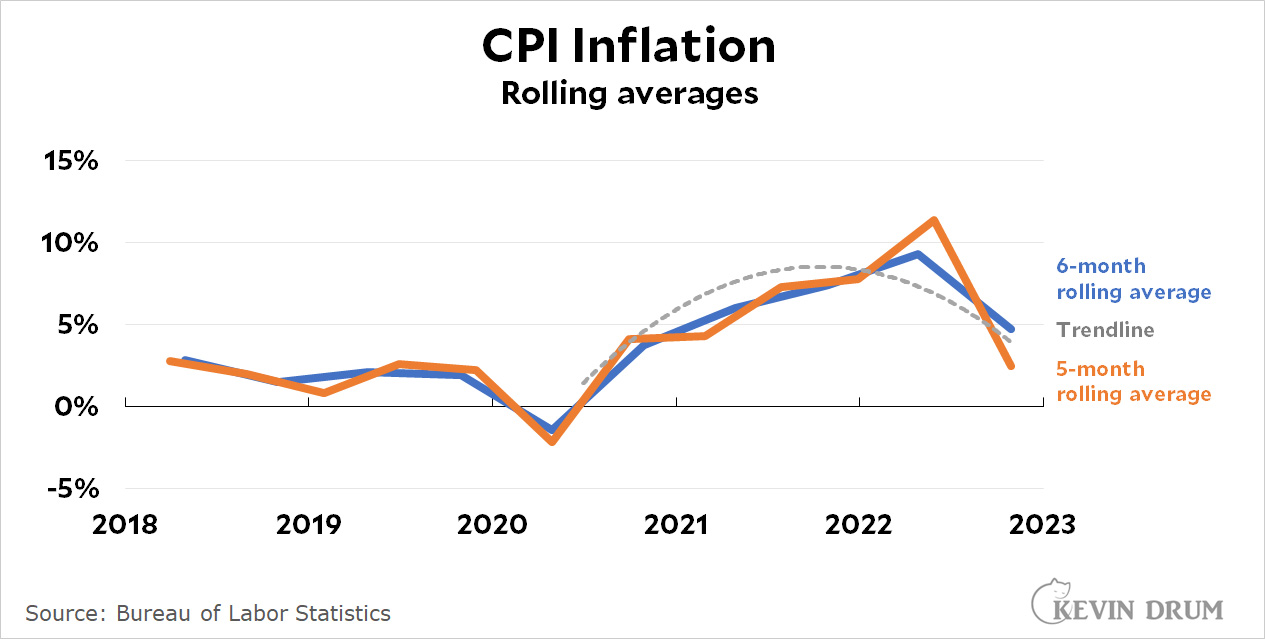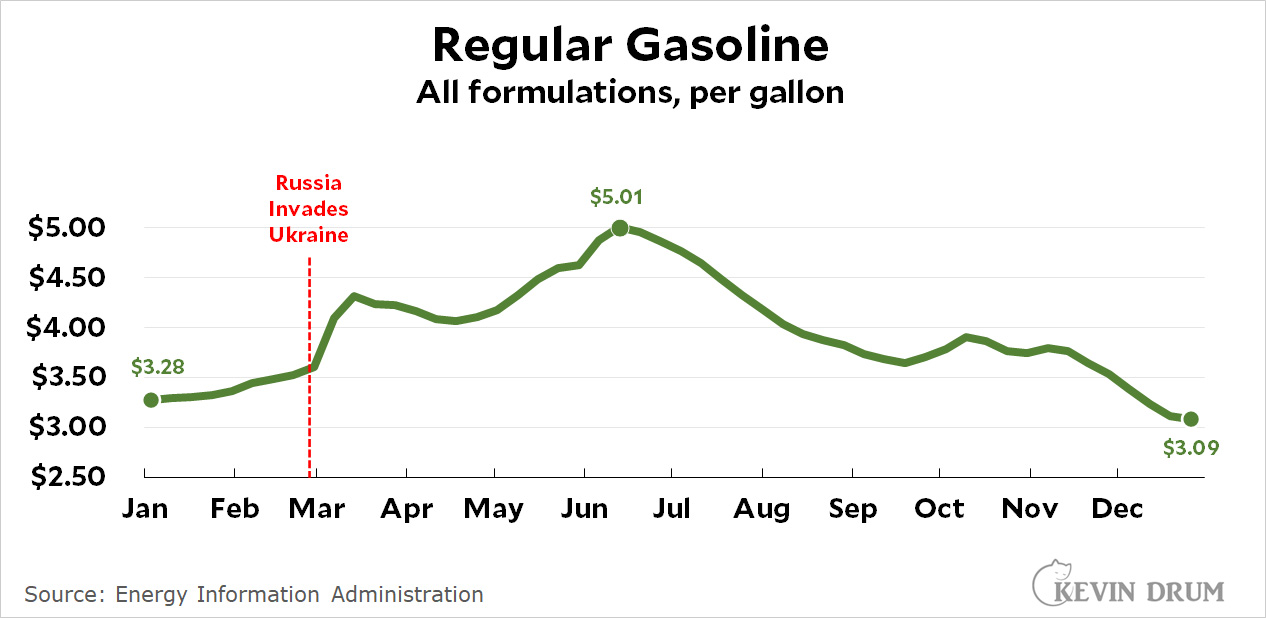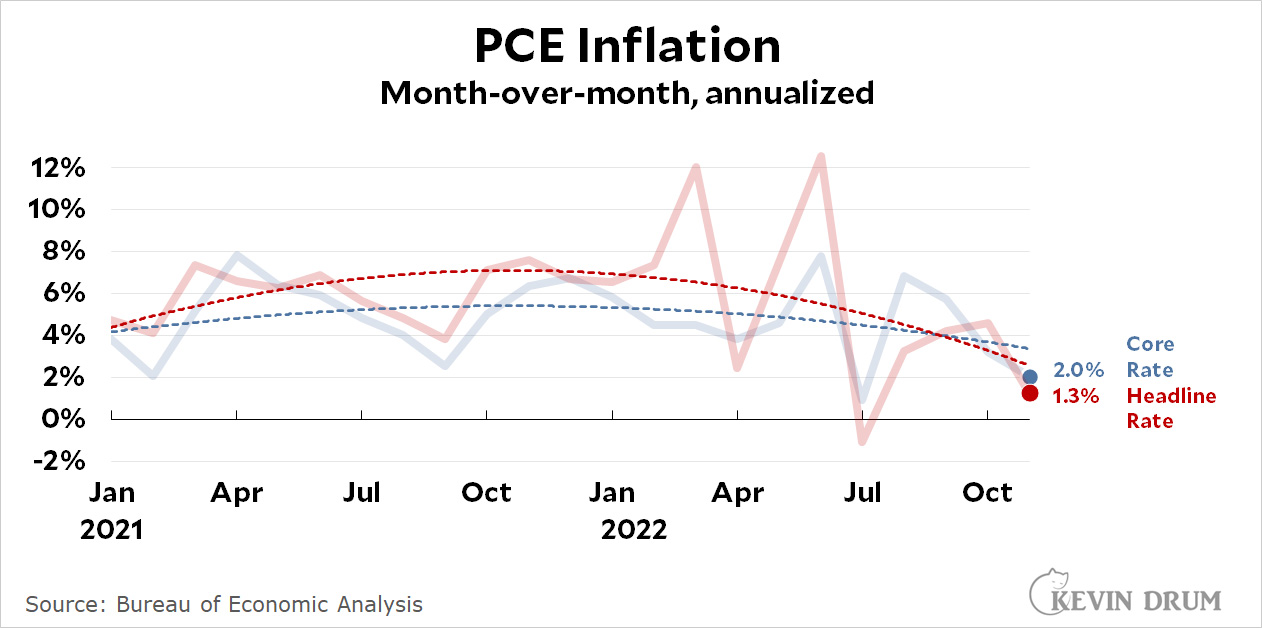This is sunset on the Seine, shortly after we left from our pier near the Eiffel Tower. I think we were passing near La Defense (off to the left) at this point.

Cats, charts, and politics

Kaiser Permanente has been really good lately about delivering all my test results quickly and efficiently. Little did I know that they have no choice:
Congress was full of good intentions when it directed the Department of Health and Human Services to make sure patients get their test results as soon as they’re available.
But the implementation of that directive has set off a battle between doctors on one side and HHS and patient advocates on the other....Doctors say that patients are now receiving news about potentially terminal disease, or other, less catastrophic but confusing, test results from patient portals before they have a chance to explain them. The American Medical Association is pressing the department to revise its rules, and the trade group for physicians is finding allies in state legislatures. But patient advocates, and HHS, say patients should, and can, decide when they want their results.
The doctors say they know how their patients feel. Patients “are extremely angry and have had harms they’re reporting from getting instant access,” AMA President Jack Resneck said. “We’re seeing a parent who finds out at nine o’clock on a Friday night when they can’t reach anybody that their child’s leukemia has recurred.”
I think the obvious answer to this dilemma is that different patients want different things. Speaking for myself, I want results as soon as they're available because I'm not the kind of person likely to panic if they're bad. And I don't feel like waiting around for them until my doctor happens to have the time to call me—or, worse, ask me to come in for a face-to-face, which will take God only knows how long to schedule.
Beyond that, if you're the kind of person who will panic if you get bad news on a Friday night, then don't check out your test results on a Friday night. Let's use a little common sense here, people.
Personally, I'm tired of all this anyway. Here's what I want: I want doctors to tell the truth. Period. I want the same truth they might provide if they were chatting about my case with a colleague in the hallway. Aside from that, I don't really care much how they present it.
Unfortunately, I've never yet found such a doctor. They all tell the truth most of the time, but when the chips are down you can't trust them. And if you press them, they get defensive and angry.
Am I exaggerating? It's possible. Maybe I'm the one who needs to act better so that doctors in turn will like me more and treat me better.
I dunno. But the truth, and nothing but the truth, is what I want.
Ezra Klein thinks J. Storrs Hall's Where Is My Flying Car? is simplistic and obtuse:
But Hall’s book is worth struggling with because he’s right about two big things. First, that the flattening of the energy curve was a moment of civilizational import and one worth revisiting. And second, that many in politics have abandoned any real vision of the long future. Too often, the right sees only the imagined glories of the past, and the left sees only the injustices of the present. The future exists in our politics mainly to give voice to our fears or urgency to our agendas. We’ve lost sight of the world that abundant, clean energy could make possible.
This is a good point, and one that's bothered me for a long time. If you ever wonder why so many people are in dismal spirits these days, this is part of the reason: both major factions of American political life are based on a diet of almost pure unhappiness. Modern conservatism is based on an endless sense of grievance and resentment, while liberalism is mostly based on outrage over the unfairness of modern society. Listening to Democrats and Republicans over the past couple of decades, you would barely know that life has gotten better by leaps and bounds for nearly everyone. And yet it's so.
On Ezra's second point, I'll make one addition: the real thing we've lost sight of is the world made possible by abundant energy and intelligence. Those are the only two things that progress requires, and we're not very far away from having them both. What's more, they're complementary: abundant intelligence helps to create new and abundant energy sources while abundant energy sources are required to power abundant intelligence.
Now, this is not everything. Energy and intelligence are necessary but not sufficient. Even if both were in almost infinite supply, we could still decide to kill ourselves in a nuclear war and we could still decide to indulge our prejudices and animosities even if we don't have anything to gain by it.
That said, the next 30 or 40 years will be the most important in the history of the human race. Large and growing amounts of clean energy and artificial intelligence will allow us to create just about anything permitted by the laws of physics—if we're able to overcome our own lizard brains and use them in tolerably fair and responsible ways. I'd say that's about a 50-50 proposition.
About a century ago, Willa and Charles Bruce were forced to sell a small strip of beach property that they had developed a few miles south of Los Angeles. The municipal authorities claimed they wanted to develop a park on the land, but the real reason they forced the sale is that the Bruces were Black and the white community didn't want them there—or the Black customers they catered to.
It took a while, but last year activists finally forced the county of Los Angeles to return the property to the Bruces' descendants. But then on Tuesday things changed:
Kavon Ward vividly remembers the sunny day in September of 2021 when she won. When Black people won....Ward didn’t know then what we all know now. That just six months after receiving the deed to the property, the descendants of Willa and Charles Bruce would decide to sell Bruce’s Beach back to Los Angeles County for $20 million.
....“I am disappointed,” Ward told me after the family announced its decision last week....“The people worked together to help them get this land back, but the people weren’t included in the decision,” said Ward, who learned of it after getting off a flight and receiving a barrage of frantic texts. “So a lot of people feel slighted.”
I have a lot of reasons to be skeptical of the reparations movement, and someday maybe I'll write about it. But this is one of them: I can't help wondering if it would cause more discord and factionalism within the Black community than it's worth.¹
 After all, this was practically an ideal case. There was no question that the land had been unfairly taken from two specific people. There was no question who the descendants were. The amount of money the descendants got was large compared to any plausible broad reparations settlement. And nobody lost anything, since the property will continue to be the same thing it's always been: a beach and a park open to the public.
After all, this was practically an ideal case. There was no question that the land had been unfairly taken from two specific people. There was no question who the descendants were. The amount of money the descendants got was large compared to any plausible broad reparations settlement. And nobody lost anything, since the property will continue to be the same thing it's always been: a beach and a park open to the public.
And yet, all it takes is the most ordinary act in the world—selling a piece of property and splitting up the money—to cause a bitter backlash. When you read stuff like this it's hard to believe that a statewide or nationwide program of reparations could truly be made to work.
¹This is in addition to the obvious backlash it would create within the white community.
Alan Blinder, a Real Economist™, says that inflation is way down:
Over the past five months (June to November 2022), inflation has slowed to a crawl. Whether measured by the consumer-price index, or CPI, which most people watch, or the price index for personal consumption expenditures, or PCE, which the Federal Reserve prefers, the annualized inflation rate has been around 2.5% over these five months.
Yes, you read that right. Yet hardly anyone has noticed this stunning development because of the near-universal concentration on price changes measured over 12-month periods, which are still 7.1% for CPI inflation and 5.5% for PCE inflation.
This is a good opportunity to get something off my chest: Anyone who didn't notice this stunning development is an idiot. Or maybe a visceral inflation hawk who needs to be put out to pasture. If you spent the past year obsessed with year-over-year figures just because those are the ones we usually use in normal times, you should not be allowed anywhere near monetary policy. Please return to the 1970s where your brain is apparently stuck permanently.
And in case you're wondering if Blinder is cheating by using a five-month average, which is admittedly a mite unusual, here's a chart:
 It so happens that inflation slowed very suddenly in July, so a five-month average that eliminates the June number is indeed a slight bit of cherry picking. But not much. The more traditional 6-month average shows about the same thing. For comparison, the dashed gray line is my usual least-squares regression, which I happen to think is the best of all.
It so happens that inflation slowed very suddenly in July, so a five-month average that eliminates the June number is indeed a slight bit of cherry picking. But not much. The more traditional 6-month average shows about the same thing. For comparison, the dashed gray line is my usual least-squares regression, which I happen to think is the best of all.
I was browsing through some other stuff and came across a set of four economic predictions I made last April. Let's see how I did:




I was a little too early on my gasoline prediction, but more than right over the course of the year. The other three were spot on. All in all, pretty good!
For those who want some basic data for the national debate that's likely to unfold once we finally have a Speaker of the House, here is federal spending over the past few years, both before and after the pandemic. As usual, the trendline is for spending prior to the pandemic, extended to the current day so we can compare it to actual current spending.
The basic story is simple: we spent a ton of money during the pandemic and then cut back in 2021 and 2022. We are currently spending at a rate slightly higher than we would have projected back in 2020, on the order of about 1% of GDP. Depending on our priorities, this is something we might or might not want to claw back.
Things are getting a little more concrete. I'm scheduled for my leukopheresis, where they extract T cells from my blood, on February 15th. It takes about a month for the lab to perform its magic, which means the actual CAR-T procedure will likely take place on March 15. Then I have four to six months of recovery.
The Ides of March! I hope it's luckier for me than it was for old Julius.